THE INVISIBLE WAY – LOW Live @ The Crocodile [Seattle]
In promotion for their new Jeff Tweedy produced release, The Invisible Way, legendary, slow-core pioneers, LOW return to perform in Seattle
Last month, I went to see one of my favorite live bands, Low. It was beautiful, tremulous, soulful, quiet and loud all at once. I have seen the husband and wife team of Alan Sparhawk and Mimi Parker six or seven times now, but this recent show at Seattle‘s Crocodile was by far the best yet. Low never disappoints! Their musicianship and vocal harmonies are fine-tuned to near perfection, and they have to be; everything is acutely audible, without much noise to drown out little mistakes. Even early on in their career as a band, when they used a lot of vocal effects and ample reverb, those things were made so subtle and singular, that every note and hum had to hold its own with perfect pitch and placement.
Their new album, The Invisible Way (produced by Wilco’s Jeff Tweedy), is yet another beautiful testament to their understated rock style, and I believe that it really brings their musical evolution full circle. Their first few releases–I Could Live In Hope (1994), Long Division (1995), The Curtain Hits the Cast (1996), and, later, Things We Lost In the Fire (2001)–are what solidified Low as critical darlings of expansive, minimal, slow sounds, pierced with quietly profound rumbles of emotion. Depressing and dreary at times, but if you listen to those early lyrics, many of the words convey more hopeful and positive ideas than the music would let you believe at first listen. Much of the content is also very dark, and anyone who has bothered to look into the personal history of the band could see why. The group took a stylistic turn in 2005 with The Great Destroyer, which was a moderate success that brought them a much larger fanbase, becoming their most recognizable body of work. The music still had its sparse, atomic qualities at times, but incorporated a much heavier guitar-driven sound and layers of harmonies. The Great Destroyer could be considered Low’s “rock record,” in terms of how powerful and busy the guitar and drum melodies are in comparison to their previous works. I will admit, I didn’t truly discover Low until that album was released.
In my early twenties, when record stores were still fairly abundant in Seattle, and I still listened to all my music by compact disc or the local independent radio station, I would wander through them aimlessly. At this point, I had yet to be swamped with overwhelming student loan and medical debt, and had very little overhead. How I miss that errant spending… Sometimes I’d scour the used cd’s for old classics that I wanted to learn about, giving myself an education in music that I thought that I needed to possess as a young visual artist in the city. At other times, I’d pour over the new releases, randomly picking up albums by artists that I knew nothing about, or had only vaguely heard of, leading to a surprise when I got home to pop the disc in my stereo. This “surprise” music shopping method didn’t always lead to satisfactory results, but every once in a while, it would pay off and produce a life-changing discovery. That is how I found Low. At first, I thought it was just pretty, emotionally heavy music and I enjoyed painting to it. Then, I began to delve into their older albums, finding used copies at various shops around town, and I completely fell in love with their stark, protruding, quiet and harmonic breaths of desperation. It satiated my dour artistic mood, and my penchant to seek out hope and inspiration in the darkest places.
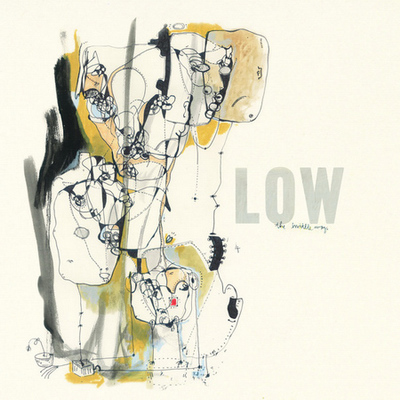 This brings us to Drums and Guns (2007), which built upon the sounds and progressions of their previous album. Pushing forward with a driving, fervent energy and heavy rhythms, while still maintaining a chilled stillness and dark mood, it continued to expand the focus from personal to more social and political issues. The gorgeously plodding C’mon (2011) came out with more Mimi-driven harmonies and uplifting melodies, set to a backdrop that was, sometimes, more prominent guitar and drum beats, and, sometimes, very stripped down, focusing on vocal harmony and single piano notes. Yet the aura was softer, almost sweet in its delivery, harkening back to a simpler feeling of a young band experimenting with their control in minimalism. Their recent release on Sub Pop seems to be somewhat of a mature reflection on their early methods. The overpowering, experimental noise of reverb is gone, replaced by carefully layered, accentuated notes and harmonies where Parker is leading the vocal charge; a shift in the band’s dynamic. The guitar is also quieter and less menacing than on their previous three records. To me, The Invisible Way is a masterpiece and an accumulation of all that the band has created and built upon throughout their 20-year career. I feel it is an amalgamation of all the personal fear, struggle, pain and glory they’ve drawn from and their outward ideas and observations on the world, intertwined into one thoughtfully organic construction of sound and emotion. The lyrics, while still maintaining a notion of the personal, are more political and socially aware than ever before–something that has been increasing steadily since the song “Monkey” debuted on college radio 8 years ago.
This brings us to Drums and Guns (2007), which built upon the sounds and progressions of their previous album. Pushing forward with a driving, fervent energy and heavy rhythms, while still maintaining a chilled stillness and dark mood, it continued to expand the focus from personal to more social and political issues. The gorgeously plodding C’mon (2011) came out with more Mimi-driven harmonies and uplifting melodies, set to a backdrop that was, sometimes, more prominent guitar and drum beats, and, sometimes, very stripped down, focusing on vocal harmony and single piano notes. Yet the aura was softer, almost sweet in its delivery, harkening back to a simpler feeling of a young band experimenting with their control in minimalism. Their recent release on Sub Pop seems to be somewhat of a mature reflection on their early methods. The overpowering, experimental noise of reverb is gone, replaced by carefully layered, accentuated notes and harmonies where Parker is leading the vocal charge; a shift in the band’s dynamic. The guitar is also quieter and less menacing than on their previous three records. To me, The Invisible Way is a masterpiece and an accumulation of all that the band has created and built upon throughout their 20-year career. I feel it is an amalgamation of all the personal fear, struggle, pain and glory they’ve drawn from and their outward ideas and observations on the world, intertwined into one thoughtfully organic construction of sound and emotion. The lyrics, while still maintaining a notion of the personal, are more political and socially aware than ever before–something that has been increasing steadily since the song “Monkey” debuted on college radio 8 years ago.
For anyone who is unfamiliar with the band, Low is comprised of Mimi Parker (percussion and vocals), Alan Sparhawk (guitar and vocals), and, currently, Steve Garrington on bass guitar and keys. Mimi and Alan have been married for the duration of their musical career, have two children together, and are liberal-minded practitioners of the Mormon faith living in Duluth, Minnesota. When Low first started out, their intention was largely to be as minimal as possible, to be as sparse with every sound and word as possible, and to slow their tempo down as much as they could. Mimi has always used a very stripped-down drum kit–it was once merely a single floor tom and a cymbal, but now includes a snare drum and another cymbal, upon which she has always employed a wire brush and a xylophone mallet. They are, historically, very into the concept of slow, precarious music, and attempting to create something interesting within their own invented parameters. Currently, these elements still exist, however the attempt to be minimal is not the driving force. It became their mode of making music because it appealed to them and people naturally responded to it, but it has evolved over time into a stylistic signature, something that can be stretched and layered with heavier sounds, varying instruments, and faster beats.
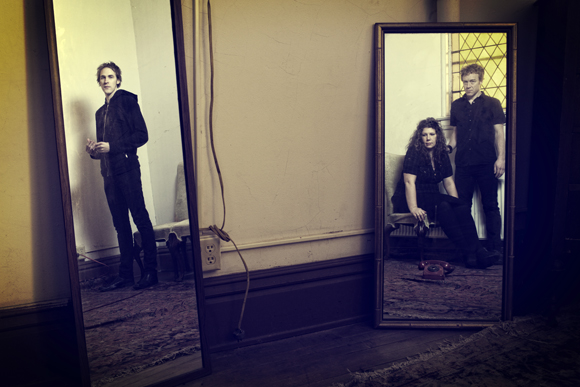
Since their upward climb in the early 2000s, the couple has parted ways with their longtime bass player, Zak Sally, who was an integral part of the band’s evolution. They’ve gone through a few changes since then, recording and touring for Drums And Guns with Matt Livingston, who then left the band in 2008, to be replaced by Steve Garrington. A wonderful addition to the group, Garrington does a phenomenal job at live shows, bouncing back and forth from bass guitar and keyboards, sometimes manning them simultaneously. He has toured with the band extensively and appeared on the recordings for both C’mon and The Invisible Way.
I have my own speculations as to why Alan and Mimi have a difficult time keeping bass players around. For one, they are married and tension must arise in band situations, which is something that would be uncomfortable for any third party among any couple. However, there was a time when Mr. Sparhawk and Ms. Parker were notorious for their onstage squabbles and bickering. I remember seeing them at Neumos back in 2006, while they were touring in support of The Great Destroyer. This was shortly after their previous tour in 2005 had been canceled due to Alan’s mental breakdown, and there seemed to be a lot of anger and confusion between he and Mimi while onstage. Anytime that Low takes the stage, a vast, unsettling stillness washes over the audience, in anticipation of that first tiny musical tone. But on this night, in addition to the usual anxious calm, there was a tension emanating from the stage that could have been cut with a butter knife. A good portion of the crowd appeared on edge as a result, and a few people even left the show early. The band still played wonderfully, and got into the songs, but there was one moment when Sparhawk started a song without deferring to the other band members, and Mimi responded by angrily throwing down her drum mallet and brush, storming offstage while saying something to the effect of “why don’t you let us know what song you’re going to play before you launch into it, huh?!” He mumbled something, stopped playing, and then coaxed her back out, where they continued on with their set. During this interaction, not a hair moved in the whole audience. We were dumbstruck by how hard that tension pushed outward and settled into our own consciousness; it took a few more songs for that feeling to ebb. That was a tough time for their family and the band. Anytime you have a formerly drug-addicted Mormon with mental instability and brilliant streaks for musical composition, you’re going to have a wild and bumpy ride! The Low story and, consequently, the Alan and Mimi story are both interesting ones, puzzling and intriguing, and, not least of all, very endearing. Evidence and insight into their life together is beautifully portrayed in the 2007 David Kleijgwegt-directed, documentary You May Need A Murderer, borrowing its title from lyrics in the song, “Murderer” on Drums and Guns. The good news is that they love each other, have a very strong personal and musical chemistry, and, aside from some weird silent tension onstage at The Triple Door a year later, I haven’t heard of them arguing in public since.
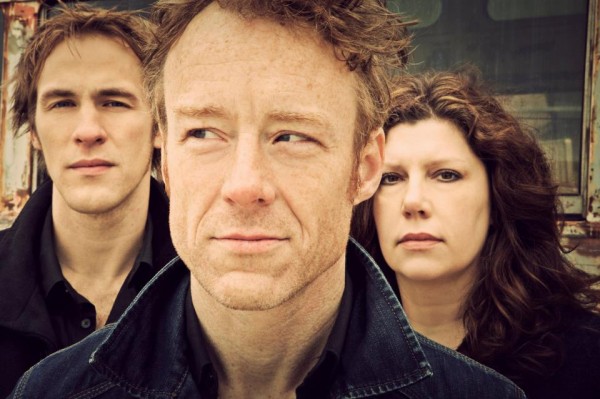
LOW
The Crocodile
Seattle, Wa
4.6.13
This time around, I was very excited to catch Low at the Crocodile, having not seen them in a few years, and I was certainly looking forward to such an intimate setting. I don’t think that I’ve arrived that early to a show since I was a teenager, waiting in line on the sidewalk to see The Smashing Pumpkins. I arrived right at 8 pm to pick up my tickets, and watched as the doors were opened to let the first 9 or 10 fans walk in excitedly to go claim their spots at the front by the stage, the bench along one side of the room, or at the bar with their first drinks in hand. I hung back, planting myself at a small counter in a corner of the club, and pulled out my notebook to start jotting down my initial impressions and expectations for the evening. As more people began to slowly filter in, I noticed that I was getting some funny stares and quizzical looks. These days, it feels like I draw more attention to myself by writing in my journal in a dark corner, than if I simply took notes by standing in the middle of the room and talking loudly into my phone. I prefer making my hands work for this effort, while my mind races forward in endless thought, repeatedly backtracking to make sure the clearest thoughts make their way from thought, to pen, to paper.
After an hour and a half, The Crocodile was completely full, and the opening act finally took the stage. Thalia Zedek (pronounced Tall-ee-ya) is a gruff folk singer with a voice somewhere between a hoarse Linda Perry and a tired Courtney Love. The band consists of Thalia on vocals and guitar, accompanied by a keyboardist and a violin player. I don’t have much to say about this act, other than noting their great juxtaposition to Low. Both bands perform as three-pieces, but whereas Low integrates all three instruments perfectly, so that they are in absolute harmony, this first band was a cacophony of clashing sounds that didn’t seem to fit together at all. Maybe it was just an audio issue or their levels were off, but I have never experienced bad sound-mixing at The Crocodile, since its renovation a few years ago. For what it’s worth, I think the members of Thalia Zedek’s band all played their parts well, but they were simply lacking that ever-so important chemistry that is crucial for a musical group to translate clearly to its audience. Low is on the opposite end of this spectrum, which is probably why they have lasted so long as a band, especially with its core members being married for the entirety of those 2 decades.
Sparhawk’s voice mixed with a steady subdued drum cadence to start Low‘s set off with “Plastic Cup,” the opening track from The Invisible Way. Floating out over a silently anxious crowd, Low‘s music is heavy– it weighs down my soul and drags my emotions to a deep churn. But it’s warm, even when the weight of its melancholy makes me want to cry or scream, it’s an embrace as comforting as a warm blanket on a winter night. Sometimes their lyrics come out of left field, but they avoid becoming silly, because you can sense the honesty and true emotion behind them. Toward the end of “On My Own,” my favorite song from the new release, Alan repeats the line “happy birthday” over and over again, as a kind of epilogue to the chorus. This was even more earnest and heartfelt live, and many of the audience members were even chanting along with him. It should be a contrite thing to say in the middle of a song, yet, coming from Sparhawk, it is so sincere that we are forced to go along with the sentiment, which immediately fits with the music.
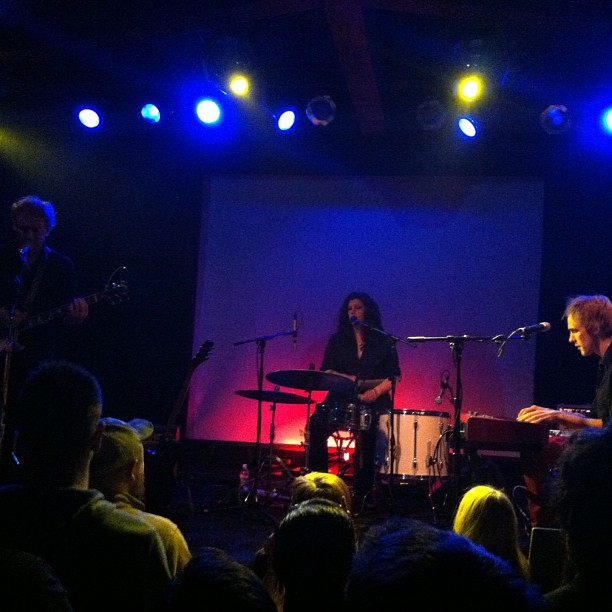
And it’s an earnesty that is hard won and very believable. Low is earnest in a way that they have nothing to prove, or hide. Not the kind of ardent protestations of bands trying to prove their alt-country, post-modern, folk rock cred, such as The Head and the Heart or The Lumineers, who, frankly, are both late to their scene yet, somehow, still making out with impressive gigs and fat checks. Alan and Mimi have been at it for two decades and, while they may not have the flashy shows or the guest appearances on SNL or Letterman, they’ve built and persevered enough of a following to be able to support a family and keep making music, year after year. With the help of their own recording business, they’ve been able to succeed by their own ingenuity and entrepreneurial spirit. They recorded C’mon, as well as a slew of other bands, at their studio in Duluth, MN, where they run their own Chairkickers label.
After treating us to their newest creations, the trio suddenly launched into the old crowd favorite, “Monkey.” The energy around me quickly ramped up and, as the the air filled with an excited buzz of familiarity, there came whistles and clapping. Off to the right side of the room, stood a group of folks who were middle-aged and older, that appeared to be relatives or family friends of the band (Sparhawk was born and spent his first 5 years in Seattle, and has family here to this day). Along with them was one rather-drunk, suburban-looking housewife type, that began hollering. She fed off of the rest of the crowd’s excitement, and raising both palms up above her head, as if in a spiritual response, she yelled, “Yeaaaaahhh! Lift, Us, Up!” A lot of us in the rest of the audience laughed, while her crew shushed her. At a very quiet moment, just after the first set of lyrics, she sloppily yelled, “Oops, sorry!” to more shushing and shaking of heads. The band members all smirked a little and kept their composure. It was a pretty hilarious moment, rivaled later by a girl on the other side of me who kept saying “I love this song soooooo much!” before every song, and then followed it up by dancing off-beat and way too fast for the tempo. The rest of the crowd behaved how you’d expect them to at a Low concert; quiet, composed and enrapt by the musical power before them. Swaying and nodding when the rhythms increased and slowing to a still state of wonder, when the electronic soundscapes permeated through the darkness. Songs like “Plastic Cup” and “Try to Sleep” (C’mon) have more of an upbeat rolling tempo, sans the reverb and spatial noise that’s prominent in so much of Low’s earlier sounds. Newer tracks like “Holy Ghost,” “Amethyst,” and “Nightengale” (from their previous release), on the other hand, are more reminiscent of early Low, but they still retain a fresh quality to them, especially in a live presentation.
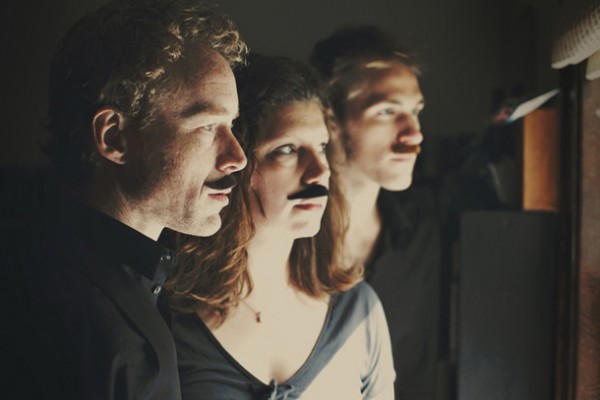
I love how uninhibited the members become onstage; just simple artists honing their precious craft and feeling every bit of passion as it seeps out physically through their beings. I could write a whole article on just the sex faces that Alan Sparhawk makes while he is singing, not to mention the guitar humping and manic gyrating that occurs during guitar solos! At one point, when he was almost violently air-humping his guitar, I noticed Mimi rolling her eyes at him and laughing, with a facial expression that said, “there he goes again”. It was one of my favorite moments of the evening, since it displayed their intimate connection to one other, as well as how caught up they can be in their craft that they are simultaneously unaware of the crowd watching their every move, while remaining acutely aware of one another. Seconds later, Alan turned and gave his wife a knowing smirk, as they both launched into the next chorus. It was a beautiful moment. I can’t place exactly what song was playing, but I remember this exchange of silent language, bathed in red lights and the adoring love of their fans, and this image of inherent human connection and creative fruition, just perfectly. Somewhere in the middle of their set, they covered Pink Floyd’s “Fearless,” applying their own sparse principals to make it their own. After supplying a healthy mix of the new and old, sprinkled with fan favorites, they came back for an encore, playing 2 songs before putting the final selection in the hands of the audience. The crowd became split, primarily between “Dinosaur Act” (Things We Lost in the Fire) and “When I Go Deaf” (The Great Destroyer). Ultimately, the band had the final word and gave us “Murderer” instead, which, given its use as the theme for the documentary and the song’s apparent staying power as a career anthem, was a very fine choice to close out the night. “One more thing, before I go. One more thing I’ll ask you Lord, you may need a murderer. Someone to do your dirty work…” That song encompasses all of the dark emotion, struggle, and perseverance that Low is known for, as well alternating their trademark quiet, sparse elements with the loud and tumultuous, all in one song.
Low is darkness, noise, pulsing slow rhythm, anguish, terror, and deep deep sadness. Masters of melancholia. Yet, through their years of making art and extracting gorgeous sounds from sadness, the group has unleashed their own unique elements of hope, feathery optimism and dreamy atonement. These days when I listen to Sparhawk’s cutting, sorrowful voice with Mimi’s pretty, undulating harmonies, my ears feel awash in dual waves of gloom and gratitude. Their message is real, but the feeling it brings can transcend reality and take the listener to places of tumultuous dance and dream-like landscapes. When I listen to Low, I trust the music. I trust it to transcend my physical reality, infiltrate my mind and transport it to another aural dimension, but I also trust it take me on this journey and land me squarely back on my feet, often with a more real perspective of the world around me than I left with. Low has helped me to recognize that emotion is a good thing, so long as you channel it where it needs to go, and work through that darkness, finding the light at the end of each marauding song.
